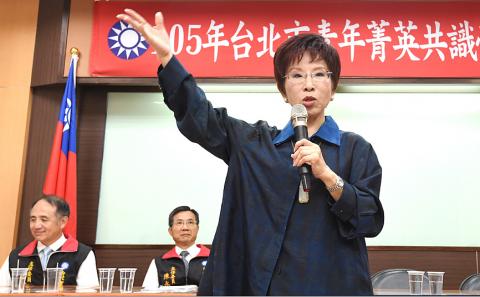Chinese Nationalist Party (KMT) Chairwoman Hung Hsiu-chu (洪秀柱) said at a “consensus camp” held by the party for young people yesterday in Taipei that critics did not properly understand the so-called “1992 consensus,” and that terms such as “unification” should not spark fear.
She also defined the China-Taiwan relationship as being “between two regions,” saying that as the Republic of China (ROC) Constitution still exists and the Act Governing Relations Between the People of the Taiwan Area and the Mainland Area (臺灣地區與大陸地區人民關係條例) has not been abolished, the cross-strait relationship is one between two regions.
Before people criticize the “1992 consensus,” they should first have a good understanding of the historical background of this term and give it an unbiased evaluation, she said.

Photo: Liu Hsin-de, Taipei Times
The “1992 consensus” — a term former Mainland Affairs Council chairman Su Chi (蘇起) admitted making up in 2000 — refers to a tacit understanding between the Chinese Nationalist Party (KMT) and the Chinese government that both sides acknowledge there is “one China,” with each side having its own interpretation of what “China” means.
Hung said that the nation’s identity is in crisis and many Taiwanese fear talk of “unification” or any mention of “zhong guo “(China,中國).
“We cannot unify others but are afraid of being unified by the Chinese Communist Party,” she said. “Taiwan simply does not have the needed materials to obtain independence, because that would mean waging a war. Do people really have the guts to throw their heads away and spill hot blood to establish a Taiwan republic?”
She said the KMT is endeavoring to help Taiwan find a way out, as there is no guarantee for how long Taiwan can maintain the “status quo,” but lamented that the KMT in doing so has often been labeled “red.”
“However, I’m not afraid of being labeled. Because politicians need to speak truthfully, rather than talk nonsense for the votes,” she said, adding that people would not support the KMT if it simply copies the Democratic Progressive Party (DPP).
Hung said that people have forgotten that the KMT kept Taiwan safe and helped it to develop and prosper after it came to Taiwan, and remember only the 228 Incident and the White Terror era.
“Has the KMT done nothing else?” she said, adding that learning from history is the way to prevent repeating it.
“It is tragic for Taiwan that some politicians always pour salt into the wound and manufacture hatred, opposition and polarization,” she said.
Hung also commented on the recent change of rules made by Academia Historica on reading files stored in the institution that would restrict people from China, Hong Kong and Macao from accessing the files, which the institution said is “returning to what the law demands.”
“The DPP in the name of transitional justice wants the KMT to open its files concerning the party’s history to the public, but at the same time discriminates against people from certain regions when it comes to accessing the nation’s history, which is a move that is clearly of questionable intent and inappropriate,” she said.

Alain Robert, known as the "French Spider-Man," praised Alex Honnold as exceptionally well-prepared after the US climber completed a free solo ascent of Taipei 101 yesterday. Robert said Honnold's ascent of the 508m-tall skyscraper in just more than one-and-a-half hours without using safety ropes or equipment was a remarkable achievement. "This is my life," he said in an interview conducted in French, adding that he liked the feeling of being "on the edge of danger." The 63-year-old Frenchman climbed Taipei 101 using ropes in December 2004, taking about four hours to reach the top. On a one-to-10 scale of difficulty, Robert said Taipei 101

Taiwanese and US defense groups are collaborating to introduce deployable, semi-autonomous manufacturing systems for drones and components in a boost to the nation’s supply chain resilience. Taiwan’s G-Tech Optroelectronics Corp subsidiary GTOC and the US’ Aerkomm Inc on Friday announced an agreement with fellow US-based Firestorm Lab to adopt the latter’s xCell, a technology featuring 3D printers fitted in 6.1m container units. The systems enable aerial platforms and parts to be produced in high volumes from dispersed nodes capable of rapid redeployment, to minimize the risk of enemy strikes and to meet field requirements, they said. Firestorm chief technology officer Ian Muceus said

MORE FALL: An investigation into one of Xi’s key cronies, part of a broader ‘anti-corruption’ drive, indicates that he might have a deep distrust in the military, an expert said China’s latest military purge underscores systemic risks in its shift from collective leadership to sole rule under Chinese President Xi Jinping (習近平), and could disrupt its chain of command and military capabilities, a national security official said yesterday. If decisionmaking within the Chinese Communist Party has become “irrational” under one-man rule, the Taiwan Strait and the regional situation must be approached with extreme caution, given unforeseen risks, they added. The anonymous official made the remarks as China’s Central Military Commission Vice Chairman Zhang Youxia (張又俠) and Joint Staff Department Chief of Staff Liu Zhenli (劉振立) were reportedly being investigated for suspected “serious

Nipah virus infection is to be officially listed as a category 5 notifiable infectious disease in Taiwan in March, while clinical treatment guidelines are being formulated, the Centers for Disease Control (CDC) said yesterday. With Nipah infections being reported in other countries and considering its relatively high fatality rate, the centers on Jan. 16 announced that it would be listed as a notifiable infectious disease to bolster the nation’s systematic early warning system and increase public awareness, the CDC said. Bangladesh reported four fatal cases last year in separate districts, with three linked to raw date palm sap consumption, CDC Epidemic Intelligence